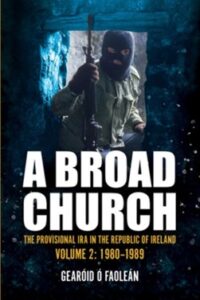Book Review: A Broad Church: The Provisional IRA in the Republic of Ireland, 1980-1989 Volume 2
 By Gearóid Ó Faoleán
By Gearóid Ó Faoleán
Published by Merrion Press
Reviewed by Dr Robert Collins
In volume one of the above title, author Gearóid Ó Faoleán described the ‘general lack of recognition about how integral the Southern state was to the longevity of the Provisional IRA’s campaign’.[1]
This author understands the underexplored element of this sentiment very well as the recent author of a similar work on the importance of Irish America to the financial health and support base of the Republican Movement during the same time period.
The first volume by Ó Faoleán, released in 2019, covered the period from the ideological split in the movement into ‘Offical’ and ‘Provisional’ wings in 1969, until 1980, just before the escalation of the prison protest with the advent of the first hunger strike in October 1980. Volume Two Similar to Volume One, Ó Faoleán charts this story in great detail.
The empirical nature of the research is evident throughout the book. In terms of sources, the book utilises a combination of a dozen or so interviews with former Republicans and activists, alongside an extensive use of newspaper sources mixed with a use of secondary sources for context.
The book aims to gauge the level of support in the Republic of Ireland by counting the number and examining the profile of republican defendants, who came before the Courts.
The book begins with several charts which are aimed at demonstrating the level of support in the Republic of Ireland in the years 1980-89 by outlining the number of defendants, their age, occupation, as well as both provincial and county breakdowns to paint a picture.
Whilst Ó Faoleán is quick to point out the limitations of this study using court reports, this is still an impressive attempt to chart these important details on the Southern support base. The book’s two biggest strengths lie in both detailing the use of safehouses across the 26 counties as training grounds for volunteers and the stories of eclectic individuals who helped further the Republican cause in unexpecting ways.
The former is testament to the meticulous research carried out by Ó Faoleán while the latter keeps any readers with a passing interest in the subject matter engaged enough to continue reading. Importantly, he also acknowledges the significant impact of killings of Gardaí in hindering support across the Republic of Ireland for the IRA.
One poignant example was the deaths of trainee Garda Gary Sheehan and Private Patrick Kelly of the Irish Defence Forces in the Derrada Wood area of Leitrim on 13 December 1983. Their deaths came following a large scale search operation following the kidnapping of wealthy English businessman Don Tidey by the IRA the previous month.
These operations damaged the public support in the South for the Provisionals’ armed campaign, in the aftermath of the electoral victories of anti-H-Block candidates and mass support of the republican hunger strikes in 1980-81 and temporarily halted Sinn Fein’s electoral growth in the South..[2]
Nonetheless, the involvement of known Republicans in local affairs and a continued semblance of tacit public support for the conflict enabled a Provisional IRA presence in the 26 counties that clearly persevered through successive Irish governments amidst threats of extradition and increased police surveillance.
This support often fluctuated depending on the contemporary climate but was never eroded fully, a point clearly made by Ó Faoleán continuously throughout the book. Given the primary focus and empirical nature of the book, it does lack a contextualisation of Provisional IRA activity in the South of Ireland in relation to both their Northern counterparts and Irish America.
Overall, Volume 2 of ‘A Broad Church’ enhances the existing historiography on the recent conflict whilst adding a unique examination of activities south of the border
It would likely have benefitted from even a brief broader analysis of how these factors impacted support south of the border. However, that is more an observation than a criticism, as the detailed nature of charting activity over a ten-year-period inevitably results in necessary omissions.
The casual reader may find it difficult to follow the plethora of names locations and events outlined in the work, but the attention to detail in the research is more to be admired than critiqued for the most part.
Overall, Volume 2 of ‘A Broad Church’ enhances the existing historiography on the recent conflict whilst adding a unique examination of activities south of the border across a critical ten-year span. Similar to Volume 1, the empirical nature of the research and high quality of source material ensures its place as a critical academic text for any researcher interested in an all-Ireland approach to studying the Republican Movement.
See the Irish Story review of Volume 1 of ‘A Broad Church’ by Gerard Madden here.
Notes
[1] Gearóid Ó Faoleán, A broad church: the Provisional IRA in the Republic of Ireland, 1969-1980 (Kildare, 2019), p. x.
[2] See Gearóid Ó Faoleán, A broad church: the Provisional IRA in the Republic of Ireland, volume 2: 1980-1989, (Kildare, 2023), pp 109-120 for an in-depth analysis of the kidnapping and deaths of Sheehan and Kelly.